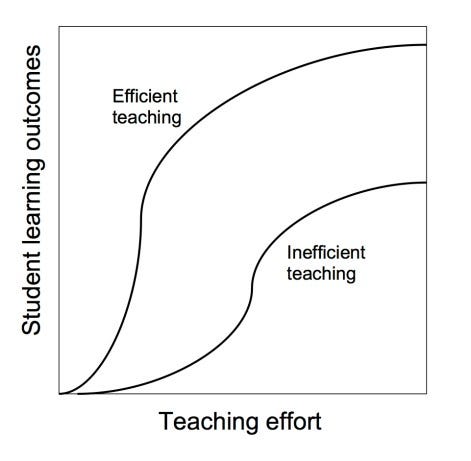Making time by teaching efficiently
Science faculty need to be highly effective teachers.
Researchers need to be highly efficient teachers.
How are teaching effectiveness and teaching efficiency related to one another? What can we do to change this relationship to best serve our students and get research done? As a working hypothesis, I suggest the following:

Many variables affect the effectiveness of teaching. Among these variables is instructor effort. The more work you you put into a course, the more students learn. After a certain amount of work, there are diminishing returns. The shape of this relationship can vary, of course, and the function that I’ve invented for the figure isn’t authoritative by any means.
What constitutes efficient and inefficient teaching? How can we increase the slope of the function? Why work for a bigger slope?
If you can teach more efficiently, then your students can learn more and you can have more time for research.
Some highly effective practices are inherently inefficient. These include frequent graded evaluations in class, multiple revisions of written work, and guiding groups of students on independent projects. Other highly effective practices are more efficient. These include guided discovery lessons, frequent checks on understanding during class, “think-pair-share” techniques, and snap ungraded quizzes at the start of every class. Research shows that they are effective teaching approaches but they don’t have to take more time to prepare.
Some technology-intensive approaches can be effective and not necessarily take much time (clickers, moderated question boards, and perhaps “flipping”) while others may take more time to set up than the payoff is worth (quizzes in the course management system, creating online videos to supplement in-class instruction). In my experience, CMS software (e.g., Blackboard, WebCT) is a massive time sink (i.e., inefficient) if you use it to do anything other than disseminate materials. They don’t help students learn as far as I can tell, and are just part of the Techo-Education complex (unless of course it’s an online course, which is a different beast altogether).
Because we all have different experiences and aptitudes, what is efficient for one person may not be for another. For example, some people report that classroom approaches that do not involve traditional lectures take a lot of time and are still worthwhile. I find it’s actually easier to not build a big fat dense lecture, but I did get some genuine training to learn how to do it. Experience with certain techniques can make them more efficient, but others (making and grading quizzes, for example) always takes plenty of time, even if you do them with clickers or some other higher-tech approach.
What are effective and efficient techniques? What inefficient techniques are we obligated to use because they are irreplaceable?


